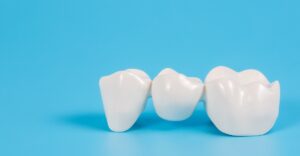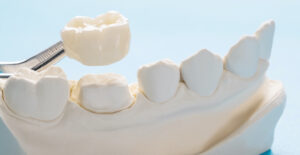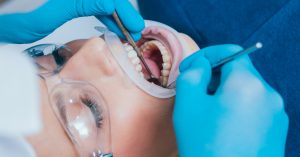Dental Plaque is a sticky, colorless film of bacteria and food debris that constantly forms on our teeth. It is the initiating factor of dental decay and gum disease, and can harden into tartar if not removed daily. When the plaque is neglected for long, it leads to tartar or calculus.
Detecting Dental Plaque
Plaque forms when the bacteria occurring naturally in the mouth reacts with the food substances to form a film. The bacteria produce acids which stick to the tooth via the dental plaque. With repeated acid attacks, the tooth enamel can break down and a dental cavity may form. Plaque can also irritate the gums around your teeth, leading to inflammation, which further progresses to gingivitis (red, swollen, bleeding gums), gum disease and eventual tooth loss.
Preventing Dental Plaque
You can easily prevent plaque buildup with proper routine oral care. These include the following:
- Brushing thoroughly after every meal to remove plaque from all surfaces of your teeth.
- Flossing daily to remove plaque from between your teeth and under your gum line, where it may be hard to get to with your toothbrush.
- Limit sugary or starchy foods, and snacking between meals.
- Visit your dentist regularly for professional cleanings and dental examinations.
Dental Tartar
If the plaque is not cleaned off the teeth regularly, it hardens over time to form tartar(calculus). Tartar usually begins to form along the gum line and can irritate gum tissues. Tartar provides plaque a greater surface area on which to grow. It is not possible to remove tartar from your teeth once it has formed, without a professional cleaning i.e no amount of brushing can get rid of it.
Detecting Dental Tartar
Unlike plaque, which is a colorless film of bacteria, tartar is a hard mineral deposit that is fairly easy to see if above the gum line. It usually appears as a brown or black line along or just below the gum line. The only certain way to detect tartar – and to remove it – is to see your dentist.
Preventing Tartar Buildup
Proper brushing, especially with a tartar control toothpaste, and flossing after every meal are necessary to reduce plaque and tartar buildup.
Once tartar has formed, it can only be removed by your dentist or hygienist by a procedure called scaling. During scaling, the dentist or hygienist may use local anesthesia and special instruments to remove tartar from your teeth above and below the gumline. It is usually done with a combination of hand instruments and an ultrasonic device. This device uses water along with high-frequency vibrations to dislodge plaque and tartar from the teeth.
Certain patients who have not visited a dentist in years and may have heavy tartar and plaque deposits. This makes it difficult for the dentist to evaluate the teeth properly. In such cases, a procedure called debridement may be done. Debridement is usually the first phase of comprehensive periodontal treatment. After completing the debridement, your dentist will re-evaluate your teeth to determine the appropriate course of treatment, which may involve scaling and root planing or gum surgery.












